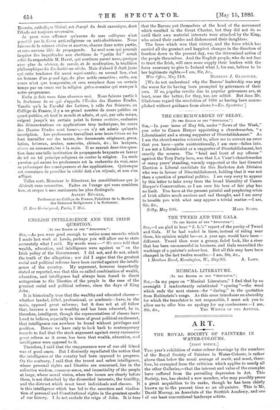ENGLISH INTELLIGENCE AND THE IRISH QUESTION.
[To THE EDITOR OF THE " SPECTATOR." I
SIR,—As you were good enough to notice some remarks which I made last week at Leeds, perhaps you will allow me to state accurately what I said. My words were :—" We were told that wealth, education, and intelligence were against us " on the Irish policy of the Government. I did not, and do not, admit the truth of the allegation ; nor did I argue that the greatest social and political reforms have been carried against the intelli- gence of the country. My argument, however imperfectly stated or reported, was that this so-called combination of wealth, education, and intelligence had always been found in direct antagonism to the liberties of the people in the case of the greatest social and political reforms, since the days of King John. It is historically trite that the wealthy and educated classes— whether landed, titled, professional, or academic—have, in the main, opposed great reforms ; but it does not at all follow that, because a man is wealthy and has been educated, he is, therefore, intelligent, though the representatives of classes have loved to believe, especially in times of great political excitement, that intelligence can nowhere be found without privileges and position. Hence we have only to look back to contemporary records to find that the stock argument against every successive great reform as it arose, has been that wealth, education, and intelligence were opposed to it Therefore, I said that the reappearance now of our old friend was of good omen. But I distinctly repudiated the notion that the intelligence of the country had been opposed to progress. On the contrary, I said that the truest and safest intelligence, where personal rights and liberties are concerned, lies in the collective wisdom, common-sense, and impartiality of the people at large, whose moral vision, when the issues are clearly before them, is not disturbed by the diversified interests, the timidity, and the distrust which must beset individuals and classes. It is this intelligence which has led to the assertion and vindica- tion of personal and Constitutional rights in the greatest epochs of our history. I do not exclude the reign of John. It is true that the Barons put themselves at the head of the movement which resulted in the Great Charter, but they did not do so until their own material interests were attacked by the King, who seized their castles and dishonoured their daughters.
The force which won that victory, and the force which has carried all the greatest and happiest changes in the direction of freedom down to the present day, was the determined action of the people themselves. And the English people, who do not fear to trust the Irish, will once more supply their leaders with the force necessary to give to Ireland what I, for one, believe to be her legitimate rights.—I am, Sir, &c., [We do not understand why the Barons' leadership was any the worse for its having been prompted by grievances of their own. If so, popular revolts due to popular grievances are, at least, none the better, for they, too, are selfish. But does Mr. Gladstone regard the revolution of 1688 as having been accom- plished without guidance from above P—En. Spectator.]


































 Previous page
Previous page